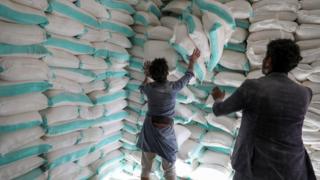This website uses cookies so that we can provide you with the best user experience possible. Cookie information is stored in your browser and performs functions such as recognising you when you return to our website and helping our team to understand which sections of the website you find most interesting and useful.
 Image copyright Reuters
Image copyright ReutersThe world is at risk of widespread famines "of biblical proportions" caused by the coronavirus pandemic, the UN has warned.
David Beasley, head of the World Food Programme (WFP), said urgent action was needed to avoid a catastrophe.
A report estimates that the number suffering from hunger could almost double from 135m to more than 250m.
Those most at risk are in 10 countries affected by conflict, economic crisis and climate change, the WFP says.
The fourth annual Global Report on Food Crises highlights Yemen, the Democratic Republic of the Congo, Afghanistan, Venezuela, Ethiopia, South Sudan, Sudan, Syria, Nigeria and Haiti.
In South Sudan, 61% of the population was affected by food crisis last year, the report says.
Even before the pandemic hit, parts of East Africa and South Asia were already facing severe food shortages caused by drought and the worst locust infestations for decades.
Addressing the UN Security Council during a video conference, Mr Beasley said the world had to "act wisely and act fast".
"We could be facing multiple famines of biblical proportions within a short few months," he said. "The truth is we do not have time on our side."
In a call to action, he added: "I do believe that with our expertise and our partnerships, we can bring together the teams and the programmes necessary to make certain the Covid-19 pandemic does not become a human and food crisis catastrophe."
The WFP's senior economist, Arif Husain, said the economic impact of the pandemic was potentially catastrophic for millions "who are already hanging by a thread".
"It is a hammer blow for millions more who can only eat if they earn a wage," he said in a statement.
"Lockdowns and global economic recession have already decimated their nest eggs. It only takes one more shock - like Covid-19 - to push them over the edge. We must collectively act now to mitigate the impact of this global catastrophe."
Earlier this month, this WFP said it was set to halve aid to parts of war-torn Yemen controlled by Houthi rebels due to a funding crisis.
It said some donors had stopped their aid over concerns that deliveries were being obstructed by Houthi forces.
The WFP feeds more than 12 million Yemenis a month, 80% of whom are in areas controlled by Houthi forces.
Yemen confirmed its first case of Covid-19 earlier this month, with aid agencies warning that the disease could quickly overwhelm the country's weakened health systems.



 Africana55 Radio
Africana55 Radio 
